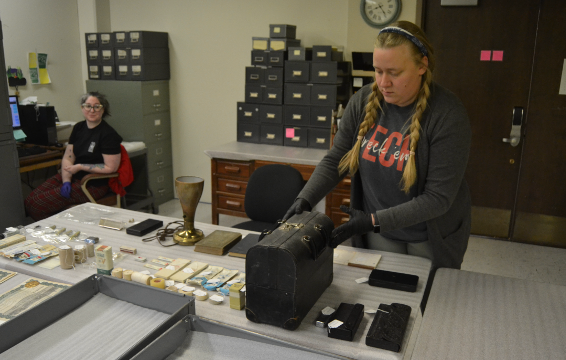Immersive Education

Accredited by the American Alliance of Museums, the Museum of Texas Tech University, including the Lubbock Lake Landmark and the Natural Science Research Laboratory, serves as a vibrant learning laboratory. It offers an immersive environment for practical experience within a working museum and heritage property. The Museum is a diverse and multifaceted cultural resource with six collecting divisions and 9.3 million objects. The collections are comprised of Anthropology, Art, Clothing and Textiles, History, Paleontology, and Natural History.
The Lubbock Lake Landmark is an archaeological and natural history preserve less than two miles from the museum. The site contains evidence of almost 12,000 years of occupation by ancient peoples as well as plant and animal life, and environmental and climatic changes on the Southern High Plains. The Landmark is a National Historic Landmark and a State Archeological Landmark.
The Natural Science Research Laboratory (NSRL) is a division of the Museum of Texas Tech University committed to building and preserving a library of our planet's natural heritage for education and research purposes. The NSRL has been recognized as a leader in the development and use of innovative methodologies for biological collections care and data management. The NSRL maintains four major natural history collections: Mammals, Birds, Invertebrates, and Genetic Resources. These collections are available to researchers at academic, scientific, and government institutions worldwide for scientific investigation, discovery, and problem-solving in the natural sciences.
Graduate students in the Heritage and Museum Sciences are presented with the chance to acquire practical experience in various heritage and museum sectors. This experience can be achieved through the remunerated apprenticeship program or by creating a specialized practicum or research course centered around a particular collection or museum or heritage related problem.
Students can pursue a six-month paid full-time internship at another museum or heritage property to complete their degree rather than writing a Master's thesis. This internship opportunity provides students with another hands-on, immersive experience and monetary compensation throughout the duration.
Heritage and Museum Sciences
-
Address
3301 4th Street, Lubbock, TX 79415 -
Phone
806-742-0627 -
Email
heritage.museum.sciences@ttu.edu
